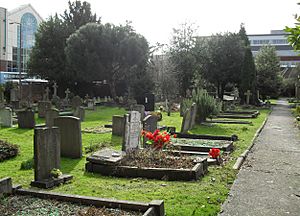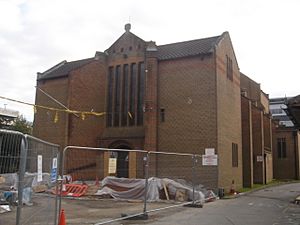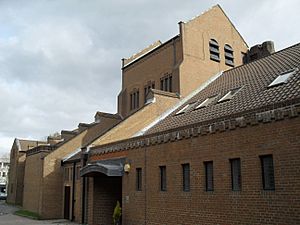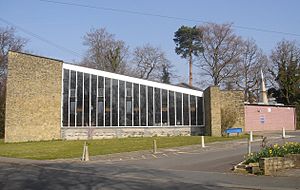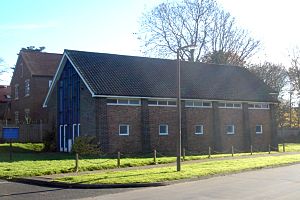Friary Church of St Francis and St Anthony, Crawley facts for kids
Quick facts for kids St Francis and St Anthony Church |
|
|---|---|
| Friary Church of St Francis and St Anthony | |
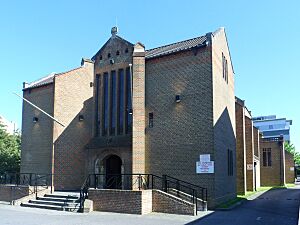
The church from the north–northwest in June 2013
|
|
| 51°06′48″N 0°11′16″W / 51.1133°N 0.1878°W | |
| Location | Haslett Avenue West, Crawley, West Sussex RH10 1HR |
| Country | England |
| Denomination | Roman Catholic |
| Website | http://crawleycatholic.church/ |
| History | |
| Status | Parish church |
| Founded | 12 October 1861 |
| Founder(s) | Francis Scawen Blunt |
| Dedication | Francis of Assisi and Anthony of Padua |
| Dedicated | 1861 (original church) |
| Architecture | |
| Functional status | Active |
| Heritage designation | Grade II-listed |
| Designated | 25 October 2007 |
| Architect(s) | Harry Stuart Goodhart-Rendel (present church) |
| Groundbreaking | 1958 (present church) |
| Completed | 18 November 1959 (present church) |
| Demolished | 1955 (original church) |
| Administration | |
| Parish | Crawley |
| Deanery | Crawley |
| Archdiocese | Southwark (formerly) |
| Diocese | Arundel and Brighton |
| Province | Southwark |
The Friary Church of St Francis and St Anthony is a Roman Catholic church in Crawley, a town in West Sussex, England. It was the first permanent Catholic church in Crawley. It was built next to a friary in 1861. Members of the Order of Friars Minor Capuchin (Capuchin friars) were invited to the area by a rich local family.
Crawley grew a lot after World War II. This meant a bigger church was needed. So, a new church was built in the late 1950s. The architect was Harry Stuart Goodhart-Rendel. The friary closed in 1980 and was taken down. However, the large brick church is still there. It stands in an important spot facing the town centre. English Heritage has given the building a Grade II listing. This means it is important for its history and design.
Contents
History of the Church
Crawley started as a market town in the early 1200s. A church called St John the Baptist was built there about 100 years later.
After the English Reformation, most people in the area were Anglican. Other Protestant groups also became common. But Roman Catholicism was almost unknown. By the mid-1800s, feelings against Roman Catholicism had changed. More people started converting from the Anglican Church to Catholicism. The Blunt family, who owned the Crabbet Park estate near Crawley, were a good example of this.
The Blunt Family and the Church's Beginning
The Blunt family was very important in the local area. Mary Scawen Blunt was a friend of Cardinal John Henry Newman, who was a famous Catholic convert. She also converted to Catholicism. Her sons, Francis and Wilfrid, became Catholic in 1852.
In 1859, some Italian Capuchin friars came to Crawley. They were invited by a relative of Mary Scawen Blunt. They held church services in a converted coach-house. Mary Scawen Blunt died soon after. She asked her sons to build a permanent Catholic church and a friary for the Capuchins.
In 1860, Francis Blunt bought land near Crawley railway station. He planned the friary and the church. The church was named after St Francis. The buildings were made of stone and brick. The church and friary opened on 12 October 1861.
Serving the Community
This church was one of the first Catholic churches in Sussex. It served a very large area in its early years. This included towns like Horsham and many villages. The friars became a respected part of the Crawley community. They did missionary work both locally and in other countries.
On 23 November 1895, a group called the Guild of St Anthony of Padua was started at the church. It became its world headquarters. This happened after a painting in the church was identified as a 15th-century picture of St Anthony. This painting, along with a beautiful altar, came from a chapel in Italy. They were placed in a side chapel, which became a special shrine to St Anthony. On 26 July 1946, Pope Pius XII officially renamed the church. It became the Church of St Francis and St Anthony.
Building a New Church
Crawley was chosen as a "New Town" in 1947. This meant it would grow much bigger. The population was planned to increase from about 9,500 to 50,000. By 1960, even more people lived there. The old friary church was not big enough for all the new worshippers. It also had some structural problems.
So, Harry Stuart Goodhart-Rendel was asked to design a new church. The first stone for the new church was laid on 14 June 1958. Two days later, the old church was taken down. The new church was built at a right angle to the old one. This allowed old tombs to be part of the new building's foundations. A local company built the church.
The new church opened on 18 November 1959. This was 100 years after the Capuchin friars first came to Crawley. The friars left Crawley in 1980. After that, the church was no longer the main place for the Guild of St Anthony.
The friary buildings behind the church were taken down. But the large burial ground next to it is still there. It has old tombs for the Blunt family. It also has the graves of Catherine Walters and Lord Alfred Douglas. Francis Blunt's tomb is inside a private chapel behind the altar. His brother Wilfrid carved a stone statue of Francis in friar's robes for the tomb. The burial ground also has three war graves from World War I and World War II.
The inside of the church was changed in 1988. This made the space more open. Another big renovation happened from October 2008 to March 2009. The church was closed during this time. The work cost £750,000 and won an award. A painting of Pope Benedict XVI's coat of arms was added.
Church Design and Architecture
Harry Stuart Goodhart-Rendel was a very creative architect. He liked to use brick in his designs. The Friary Church is easy to spot as one of his buildings. It is a large but low building made of dark greyish brick. It has detailed red-brick patterns. The roof is made of pantiles. The main entrance has a round arch. Above it are five tall, narrow windows with fancy designs.
Inside, the long main hall (nave) has a concrete ceiling. It is painted with a hexagonal pattern. The nave has aisles on each side with plain arches. A small tower sits above the middle of the church. The shrine to St Anthony of Padua was moved from the old church and is now in the south aisle. The church has many wooden features, like screens and pews. However, the original altar was removed during the changes in the sanctuary. A new altar was brought from another church.
The Church Today
The Friary Church was listed as Grade II by English Heritage on 25 October 2007. This means it is a "nationally important" building. It is one of the best works by Goodhart-Rendel. It is also important because it shows how Crawley grew in the mid-1900s.
The Friary Church is the main church for Crawley parish. It manages the five other Catholic churches in Crawley. As Crawley grew, more churches were needed.
- The Church of Our Lady Queen of Heaven in Langley Green opened in 1959.
- St Bernadette's Church was built in Tilgate in 1962.
- St Edward the Confessor's Church in Pound Hill opened in 1965.
- St Theodore of Canterbury's Church in Gossops Green was built in 1971.
- The Church of Christ the Lord in Broadfield became a Catholic church in 1982. It is also used by Anglicans and the United Reformed Church.
The Friary Church holds four Sunday Masses. There is also a daily Mass. Confession is offered weekly.
Two schools are connected to the church:
- St Francis of Assisi Primary School, which opened in 1950.
- St Wilfrid's Catholic School, a secondary school that opened in 1952.
See also
- List of places of worship in Crawley
- Listed buildings in Crawley


